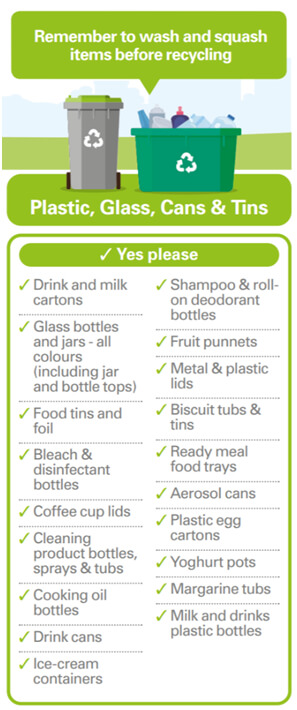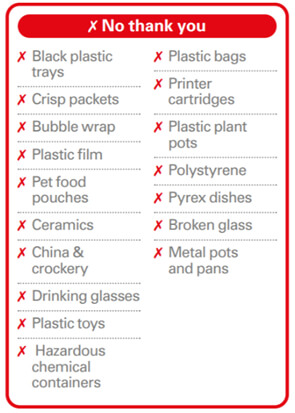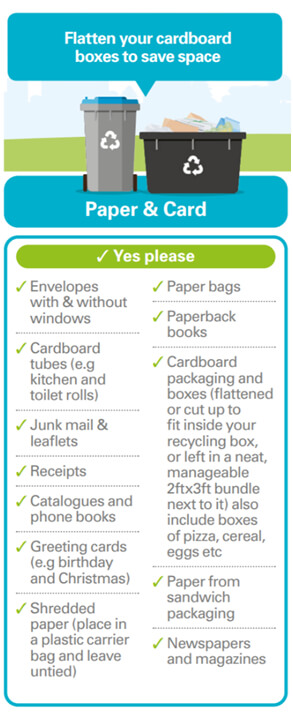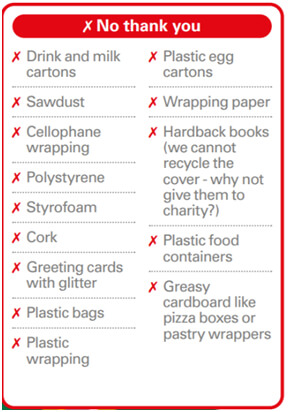While our growing team has been a welcome addition for Make Me Local, our growing waste bin has not! We have noticed that the amount of waste generated in the office has almost doubled in the last few months, and while we have always been keen recyclers, we thought we would revise some of the Bromley recycling rules to check we are doing our absolute best to keep our landfill waste to a minimum. Embarrassingly, we found out that recycling is not as simple as we thought, and we were actually getting plenty of things wrong.
Why should we recycle? Waste that is not recycled ends up on landfill sites. When waste rots, it gives off methane. Methane is one of the greenhouse gases that contribute to climate change. Another reason we should reduce the amount of waste we send to landfills is that we are simply running out of landfill space.
With all this in mind, we thought we would share our findings in a bid to improve the recycling efforts of Bromley’s residents and do our bit to save our precious planet.
Bromley plastic recycling
Recycling calls for much more attention to detail than you may think. The important things relating to plastic recycling waste that we’ve learned lately are:
Always check the packaging first to see if it is recyclable or not – some elements of the packaging might be while others may not. Take yogurt pots for example, the actual pot is recyclable but their peel back lids are not.
The plastic problem is very disturbing, but worse than not recycling plastic at all, is putting non-recyclable black plastic (such as food trays and black plastic flowerpots) in the recycling. Conventional black plastic pigment cannot be detected by the near-infrared technology used in plastics recycling. Supermarkets are slowly phasing out black plastic, but for now, let’s make a collective effort to boycott it entirely.
With regards to other plastics, Bromley council state that the general rule of thumb is “if the plastic waste ‘scrunches’ then we can’t recycle it“. However, they do take rigid plastic food containers. For example, if you are partial to a pre-made salad at lunch time that comes in a (non-black) rigid plastic container with a peel back plastic lid, you will not be able to recycle the lid element. The same goes for your afternoon packet of Walkers – crisp packets are not recyclable. If you wash your lunch down with a can of something – great. Drink cans are 100% recyclable. In fact, recycling one aluminium can saves enough energy to power a TV for three hours, and it takes 95% less energy to recycle a can than to make a new one*.
PLASTIC BAGS ARE NON-RECYCLABLE.
Tin foil is in, but cling film is out. In fact, lets add cling film to the boycott list (mental note: don’t buy cling film ever again)!
Always rinse cans, tins, jars and trays because food residue can contaminate and hinder the reliability of the recycling process. If you can rinse them in left over washing up water (to avoid wasting water) then all the better.
If you have a clumsy household or office member, who is prone to knocking over drinking vessels, know that drinking glasses should be wrapped and put in the general bin, not in glass recycling. This is because drinking glasses have a different chemical composition, so when they are mixed with container glass, it can make the newly recycled glass weak and unreliable.
Here is a handy checklist from the Bromley Council website…


Bromley paper recycling
With four billion trees cut down every year for paper and the average family throwing away six trees worth of paper a year, it is important to get paper waste recycling right. Our key lessons learned with paper waste recycling are as follows:
Being a digital marketing company, we are not big paper printing fans however, we are partial to using an envelope or two (especially as we all love buying and selling stuff on eBay in our free time!). Whilst envelopes can be recycled, be careful to remove any bubble wrap from inside or any tape that they have on them before you put them in the recycle box. Similarly, during lockdown we also jumped on the online shopping bandwagon and definitely contributed to the 200% increase in online transactions during that time! More deliveries equals more cardboard which we do recycle, but not all of us realised that a) if plastic tape is not removed from the box, then it cannot be recycled and b) boxes should be flattened. Turns out its fun to stomp on boxes (so Red tells us anyway).
Guilty of indulging in a takeaway pizza at the weekend? Well, pizza box smudged with marinara sauce is a big no-no. Tear off the incriminating smudges and re-bin.
Often, councils will not collect card and paper recycling when it is wet, but luckily Bromley does. However, they do ask residents to “store their recycling in a dry place before collection day, if possible, as the recycling potential of paper is higher when it’s dry”.


If you reside in the borough of Bromley, why not download the full Bromley Recycling Guide and display clearly above the recycling centre in your office or home. The guide will also inform you what is/is not acceptable in other collections such as food waste, textiles, batteries and electrical items. Different areas have different recycling schemes so, if you are based outside of Bromley, check your council’s website for details.
Our extra effort into researching what we can and can’t throw into the bin has made our team much more conscientious about what we throw away. To our surprise, making the effort to learn what goes where was enjoyable and effortless. Once we had mastered the details, it took no time at all to sort, rinse and flatten, and it is comforting to know we’re not responsible for contaminated or incorrect recycling. It doesn’t feel like a chore now, it’s rewarding to do better, and in all honesty it’s a relief not to watch Nathan rifle through the bins each week correcting our mistakes!
Hopefully, this has proved helpful to your home or office team, and you will be inspired to make a few minor changes that could really make a significant difference.